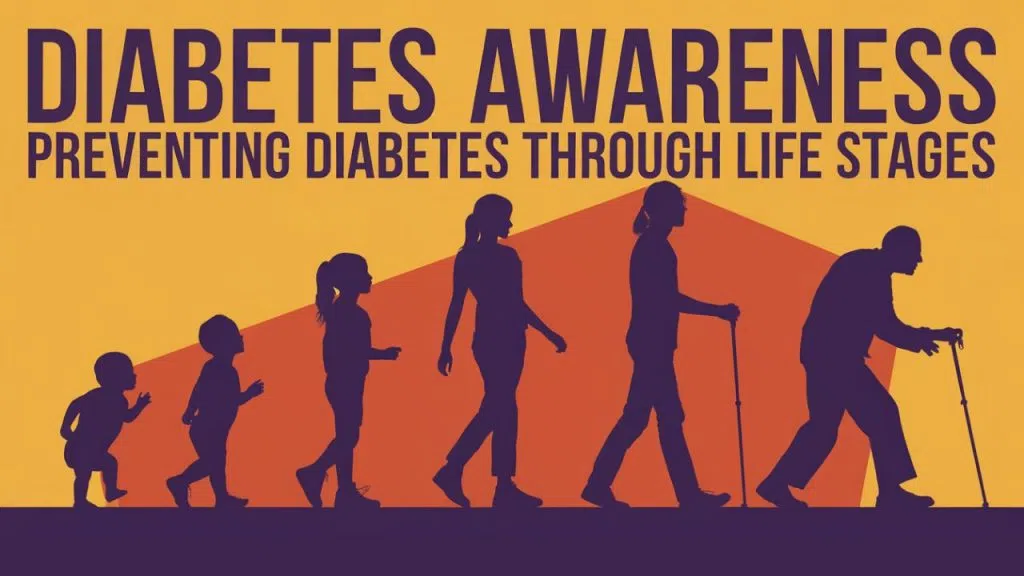
November is Diabetes Awareness Month, a time dedicated to spreading knowledge about diabetes prevention, especially as younger generations start building healthy habits that will protect them later in life. While diabetes can be influenced by genetics, adopting healthy lifestyle choices at different stages of life can significantly reduce the risk of developing type 2 diabetes.
The Importance of Diabetes Awareness
Diabetes affects millions of people globally, with over 37 million Americans living with the condition, according to the Centers for Disease Control and Prevention (CDC). Among these, type 2 diabetes is the most common and can often be prevented or delayed through proactive health measures. With a strong focus on prevention, individuals can make informed decisions that protect their health as they age.
Prevention Tips by Life Stage
Childhood and Adolescence
Developing healthy habits from an early age sets the foundation for lifelong wellness. The focus should be on encouraging physical activity and balanced nutrition during childhood and adolescence.
- Encourage Active Play: Children should get at least 60 minutes of moderate to vigorous physical activity daily. Sports, cycling, and active play can help maintain a healthy weight and insulin sensitivity.
- Healthy Eating Habits: Limiting sugary snacks and drinks and focusing on whole foods, including fruits, vegetables, and whole grains, helps regulate blood sugar levels from a young age.
Young Adulthood (20s-30s)
This stage is crucial for maintaining active habits and establishing consistent health routines.
- Balanced Diet: Opt for a diet high in fiber, lean protein, and healthy fats. Foods like vegetables, legumes, fish, and whole grains can help prevent blood sugar spikes.
- Regular Health Screenings: Early detection of prediabetes through blood tests is essential. Routine check-ups can monitor blood sugar levels and catch any early signs of metabolic issues.
- Stay Active: Adults should aim for at least 150 minutes of moderate aerobic activity each week. Incorporating strength training is also beneficial for metabolism and blood sugar control.
Middle Age (40s-50s)
For those entering middle age, metabolism can slow down, increasing the risk of weight gain and insulin resistance.
- Manage Stress: Chronic stress can contribute to higher blood sugar levels due to the release of cortisol. Incorporate relaxation practices such as yoga, meditation, or deep breathing exercises.
- Monitor Weight: Maintaining a healthy weight through physical activity and mindful eating can significantly lower diabetes risk.
- Regular Screenings: Continue regular blood sugar testing, especially if there’s a family history of diabetes. Early interventions can prevent or delay the onset of type 2 diabetes.
Older Adults (60s and Beyond)
Even in later years, diabetes prevention is possible and can lead to improved quality of life.
- Stay Active Safely: Low-impact exercises like walking, swimming, or tai chi can help keep blood sugar levels in check without putting too much strain on the body.
- Healthy Diet Adjustments: Ensure meals are balanced and rich in fiber, with reduced refined sugars and processed foods.
- Stay Socially Engaged: Studies have shown that staying connected with friends and community activities can help with mental and physical health, indirectly supporting diabetes prevention.
Understanding Family History and Genetics
Genetics plays a significant role in an individual’s risk for diabetes. According to the National Institute of Diabetes and Digestive and Kidney Diseases (NIDDK), having a first-degree relative with type 2 diabetes increases your risk. While you can’t change your genetics, you can adopt preventive measures that lessen the overall impact.
- Talk to Your Doctor: Discuss your family history with your healthcare provider to assess your risk and create a personalized prevention plan.
- Lifestyle Over Genetics: Studies indicate that lifestyle choices can outweigh genetic predispositions. Maintaining healthy habits can prevent diabetes even if you have a strong family history of the disease.
Local Resources for Diabetes Support and Prevention
Here are some local resources to support your diabetes prevention journey, including places for health screenings, nutrition guidance, and wellness programs:
- Grand Forks, ND:
- Altru Diabetes Center: Provides comprehensive diabetes care, education, and support services.
- St. Cloud, MN:
- CentraCare Diabetes Program: Offers personalized care and education programs for diabetes prevention and management.
- Detroit Lakes, MN:
- Essentia Health Diabetes Care: Provides diabetes care and prevention services.
- Alexandria, MN:
- Alomere Health – Diabetes Education Program: Offers programs focused on diabetes education and prevention.
- Fergus Falls, MN:
- Lake Region Healthcare – Diabetes Services: Provides resources for preventing or managing diabetes. Learn more here.
- Winona, MN:
- Winona Health – Diabetes Education Services: Offers diabetes management and prevention programs tailored to individual needs.
Final Thoughts
Diabetes prevention is a lifelong commitment that starts with understanding your risk factors and making healthy choices at every stage of life. From childhood through older adulthood, taking steps to maintain a healthy weight, stay active, and eat a balanced diet can make all the difference. This November, as we observe Diabetes Awareness Month, take the opportunity to assess your habits, prioritize your health, and take advantage of local resources available in your community.
Copyright 2024 Unveiled Local. All rights reserved. Written by humans, assisted by AI. This material may not be broadcast, published, redistributed, or rewritten in any way without consent.

